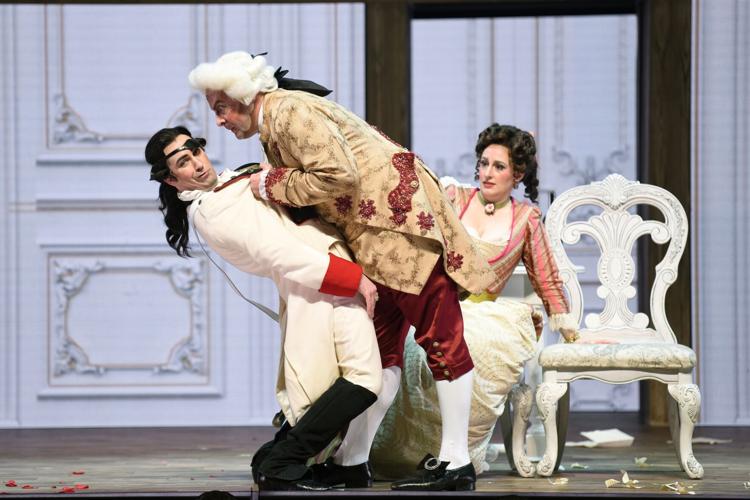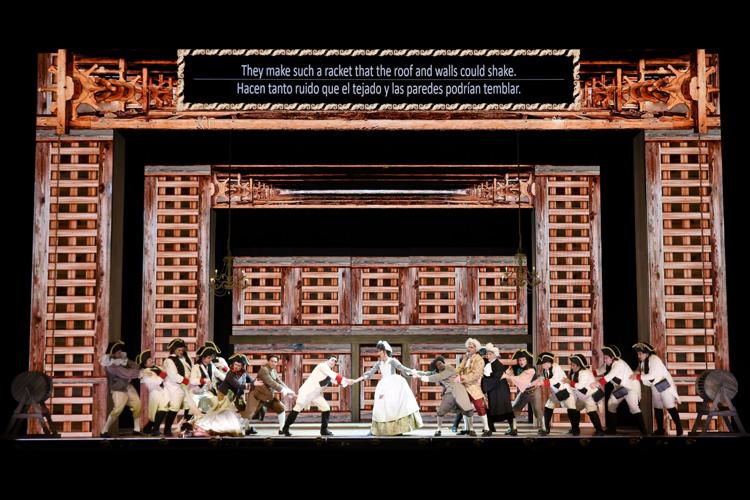You expect to laugh with Rossini’s “The Barber of Seville,” but we didn’t expect to laugh as much as we did at Linda Ronstadt Music Hall on Saturday night.
Arizona Opera‘s uproariously funny new production of “Barber” took the composer’s ha-ha factor to a whole other level courtesy of a supremely talented cast with the comic timing of veteran sitcom actors.
Stage director Joshua Borths exaggerated every comic turn. The chorus danced along as Conductor Roberto Kalb and the orchestra brought out the powerful drama of Rossini's famous overture. Moments into that Act 1 dance, Borths turned on some of the house lights and the chorus looked out into the audience as if they just realized they weren’t alone.
He also had Figaro (the wonderfully voiced and very funny baritone Alexander Birch Elliott) make his grand entrance through the audience and once on stage, as he sang the narcissistic ode “Largo al factotum,” Elliott goaded the audience into joining him in singing the refrain “Figaro, Figaro, Figaro.”
The audience happily played along, waving to the chorus in that opening scene, cheering on command and laughing, loudly, throughout.
There was soprano Elizabeth Sutphen’s Rosina, the ward of Dr. Bartolo (bass-baritone Aubrey Allicock), who blew kisses to the audience at the end of “Lindoro,” her aria pledging how she “can be a viper” if a lover crossed her. Sutphen segued from lyrical coloratura runs to schoolgirl snarky asides and animated outbursts reminiscent of spoiled child tantrums and teenage angst. In one scene with the Count and Figaro, she encouraged the audience to applaud. When they reluctantly obliged, she encouraged them to repeat it, only louder.
Allicock’s Bartolo was the perfect patsy to Figaro, Rosina and the Count in their ploy to quash the good doctor’s plans to marry his young charge for her money. Allicock, in his Arizona Opera debut, snagged some of the evening’s biggest laughs when he mocked Rosina by mimicking her high-pitched voice as she tried to avoid his advances.
Tenor Santiago Ballerini as Count Almaviva showed off some impressive coloratura as he and the chorus tried to serenade Rosina from the street beneath her window. When it looked like he had failed, the Count squirmed between the choristers, tossing coins to try to keep them quiet.
Elliott, also making his company debut, played a delicious narcissist, taking credit for pulling off the deception that ended with Rosina and the Count saying, “I do.”
Then there was mezzo-soprano Lauren Cook’s Berta, the unassuming housekeeper and gofer who quietly watches the crazy around Dr. Bartolo’s household before venting with the aria “Il vecchiotto cerca moglie.” Cook delivered some of the show’s funniest moments with her spot-on physical comedy.
Some of the comedy also came from Arizona Opera’s state-of-the-art video wall, comprised of up to 240 interlocking LED panels that created the settings, from Rosina’s bedroom to the parlor, street and ballroom. Chorus members would crank two large turnstiles on either side of the stage when they wanted to change the setting, making it appear that they were in control of the changes. At one point, when things were getting a bit chaotic between Figaro, Dr. Bartolo, the Count and Rosina, the set-turners cranked furiously as the sets went from night to day and room to room before settling on a lopsided mishmash of several sets.





